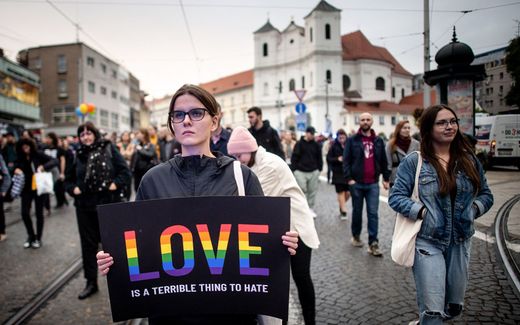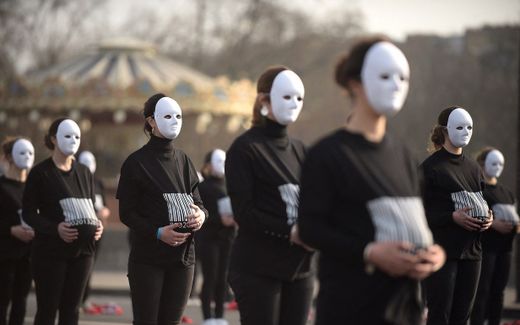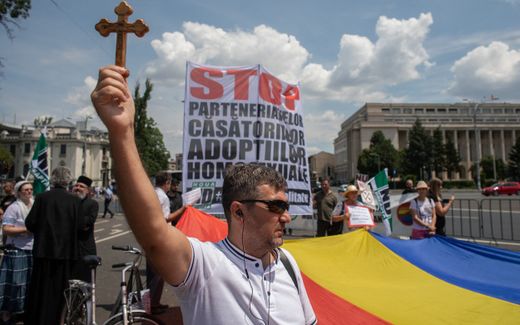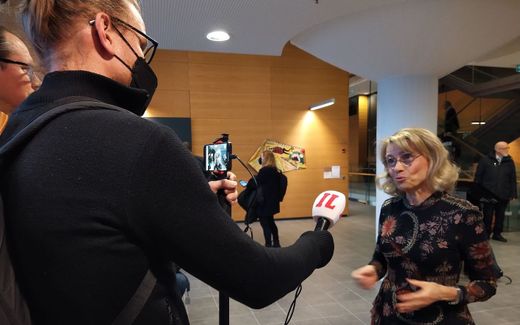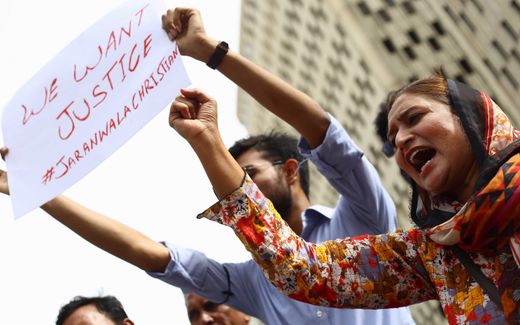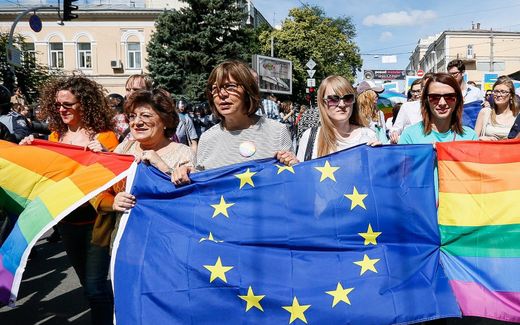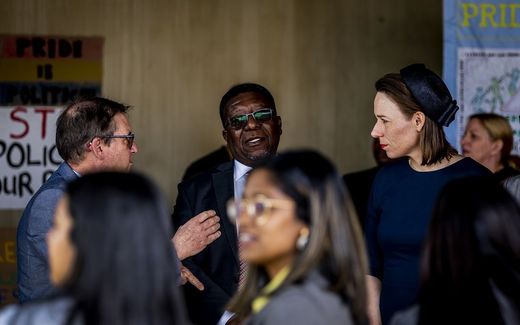Also Christians can identify with human rights declaration
12-12-2023
European Union
Norbert Schäfer, PRO
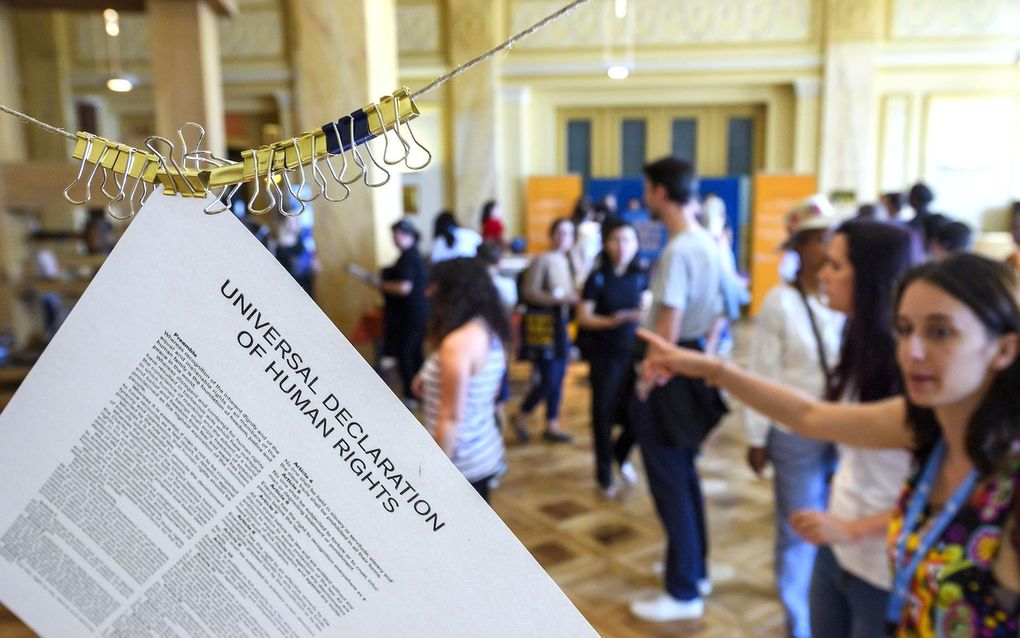
People visit the United Nations Human Rights Office during the open day in its Geneva headquarters Palais Wilson in Geneva, Switzerland. Photo EPA, Martial Trezzini
European Union
The UN Declaration of Human Rights protects the dignity and fundamental rights and freedoms of all people in 30 articles. Human rights expert Prof. Heiner Bielefeldt explains why the concept of human dignity is difficult to grasp.
Article 1: All human beings are born free and equal in dignity and rights. They are endowed with reason and conscience and should act towards one another in a spirit of brotherhood.
Mr. Bielefeldt, December 10 marks the 75th anniversary of the Universal Declaration of Human Rights (UDHR). What prompted the resolution, and what is its intention?
Heiner Bielefeldt: "The declaration is characterised by the immediate post-war period and the hope that humanity would learn from the traumatising upheavals of war, state totalitarianism and, above all, Nazi terror. In the face of the monstrous crimes against humanity, a "conscience of humanity", as the declaration explicitly states, has come forward. The second sentence of the resolution's preamble speaks of "acts of barbarism", referring to National Socialism, but also to other forms of "mega crimes".

It was hoped that humanity would come together in the UN under the shock of such experiences. The declaration of human rights by the UN General Assembly in 1948 was intended to create a new binding basis for international cooperation, international politics and international law. Seventy-five years later, we know how difficult all this still is. Unfortunately, we cannot say that the idea has been realised, but we certainly cannot say that it has lost its meaning either."
The Universal Declaration of Human Rights
On December 10 1948, the General Assembly of the United Nations (UN) adopted the Universal Declaration of Human Rights. The 30 articles protect the fundamental rights and freedoms of all people. The UN Charter of Human Rights includes the right to life, liberty and security, freedom of expression, protection against discrimination and torture, emphasises the equality and inviolability of human dignity, regardless of race, gender, religion or social origin and calls for the right to education, work and participation in cultural life. The Declaration is regarded as the guiding principle for the protection and promotion of fundamental human rights worldwide.
The Universal Declaration of Human Rights is drafted as a resolution - i.e. a statement of intent - to which the UN member states commit themselves. Is it legally binding or just a collection of nice words?
"As the resolution has been included and reaffirmed in many subsequent legally binding documents, the document can also be said to have a certain legally binding force. However, the Declaration of Human Rights was initially formulated as a political declaration of intent. Its substance was later translated into legally binding standards that are formulated in much greater detail. In this way, a whole series of conventions binding under international law emerged in the decades following the UDHR. The UDHR thus marks the beginning of a process that has led to concrete, legally binding standards over the years. The declaration has also had an impact on national case law. Some countries have even incorporated it into their constitutions. The Basic Law of the Federal Republic of Germany has also adopted some formulations directly from the UDHR."
In the Christian view of humanity, human dignity is based on the likeness of human beings to God. What is the concept of dignity in the UDHR based on?
"In UN documents, you will not find a substantive definition of what is fully meant by the concept of dignity. Instead, practical consequences are drawn from respect for human dignity, such as the prohibition of torture or racism. The attempt was therefore not made to define the concept of dignity at a fundamental level but instead focussed on the practical consequences.
For example, discrimination against disabled people is not compatible with human dignity. Neither, of course, are torture and cruel forms of neglect of people in old people's homes. The first article of the UDHR –which is often quoted– states that "all human beings are born free and equal in dignity and rights".

The idea of reason and conscience is then introduced. "They are endowed with reason and conscience and should treat one another in a spirit of brotherhood", it says. It is, therefore, about respecting people as subjects of responsibility. People must never be treated as mere objects; they are always subjects. Human dignity has a lot to do with the quality of the human being as a subject.
A person's dignity is inviolable, inalienable, irrevocable – and it is also unfathomable in terms of content. All of these adjectives begin with the negative prefix: "un". It is indeed the case that we can communicate more easily about human dignity when we are talking about phenomena of violation that need to be rejected. It is less easy to say exactly what human dignity means in positive terms, and, above all, it is probably much more difficult to reach a consensus on this. I believe it is in the nature of things that human dignity can never be completely defined."
A religious, Christian reference was deliberately included in the preamble to the Constitution in Germany. Why not in the UN Charter of Human Rights?
"The Universal Declaration of Human Rights virtually forbade any direct religious reference. There were certainly considerations to include some kind of reference to God in the declaration. However, these failed very clearly, with the argument that this would make the Declaration more difficult to receive, which is why it was abandoned. As a result, the UDHR has a consistently secular legal language.
Of course, this does not exclude the possibility that people with genuinely religious motivations, including Christian motives, may devote themselves to human rights. The main reason why the document is deliberately formulated in secular terms is so that it can be understood from various religious and non-religious perspectives without establishing certain monopolies of interpretation. Those who were involved at the time, whether directly as diplomats or indirectly via NGOs, naturally included people with Christian convictions. But such a conviction cannot be enshrined as a binding basis in a UN document.
Article 18 of the UDHR guarantees freedom of conscience and religion. Do religious communities have a responsibility to enforce human rights?
"This responsibility exists, but it is not to be understood primarily in legal terms, but above all in ethical terms. Human rights are first and foremost addressed to the state, which must respect them and, at the same time, actively enforce them. The state can then actively oblige the religious communities – for example, by requiring them to be non-violent in their internal relations, especially when dealing with internal dissidents, critics or people who want to leave the community.
However, the state could not, for example, enforce the priesthood of women for the Catholic Church. There have been demands to this effect for a long time, but it is not the task of the state to implement this. Such an issue must be approached differently.
The churches now see themselves as human rights actors. Still, they often have a credibility problem when it comes to issues such as gender equality. This shows that a religious community that places itself in a human rights context accepts certain consequences that also affect its own self-image. The Catholic Church has a particularly hard time with this."
Why did the Vatican have difficulties with the UDHR for so long?
"The Vatican made its peace with human rights at the Second Vatican Council. Interestingly, until then, religious freedom had been the main stumbling block. Religious freedom takes the religious dimension of human existence seriously, which is why it is important as a human right. But religious freedom has traditionally been feared because it seems to leave questions of religion, faith, bliss and truth entirely up to people. It was seen as a culture of relativism. This was not acceptable to the Catholic Church for a long time. Incidentally, religious conservatives still have fundamental reservations about the concept of religious freedom today."
In Germany, there is a debate on the Prostitutes Protection Act, which legalises prostitution, and the possible introduction of the Nordic model, which criminalises buying sex. How should prostitution be assessed from a human rights perspective?
"It can be clearly stated that the concept of "inalienable" rights rules out anything like selling oneself into slavery. This is what this historical concept of "inalienability" stands for. It is not possible for a person to submit to a master in a contract under private law and thereby divest themselves of their subject quality. However, the implications of this concept for prostitution are controversial.
According to one interpretation, prostitution is, by definition, coercive –including structural or financial coercion– and is, therefore, always a violation of human rights. Another position is that as long as a woman or man can really decide of their own free will, some things must be possible, even if they are morally problematic. In any case, there are at least strong challenges to prostitution in terms of human rights.
However, whether prostitution per se constitutes a human rights violation remains controversial. In the case of forced prostitution, there is, of course, a clear violation of human rights."
Humanity is facing upheaval through digitalisation, artificial intelligence and climate change. These processes affect and threaten a large part of humanity. Do we need to adapt or extend human rights?
"We have basically always done that. At a national level, the Federal Constitutional Court was probably the first court in the world to postulate something like informational self-determination. That was in 1983 and was triggered by the census. Steps were taken at the international level to protect digital rights and privacy. Germany was one of the driving forces behind the establishment of a UN Special Rapporteur on Digital Rights. At the EU level, there are legal regulations for the internet giants. This shows that the challenge is being taken up.
Discussions on the ecological dimensions of human rights have also been taking place internationally for a long time, for example, in the UN or the EU. A few years ago, the UN launched its own reporting on human rights and climate protection. In Germany, the Federal Constitutional Court pointed out in spring 2021 that climate protection includes a dimension of freedom for future generations. Human rights have, therefore, certainly taken up such new challenges. It is quite clear that human dignity and human rights are seriously jeopardised by these developments."
Who is Heiner Bielefeldt?
Heiner Bielefeldt holds the Chair of Human Rights and Human Rights Policy at Friedrich-Alexander-Universität Erlangen-Nürnberg. From June 2010 to October 2016, he was the Special Rapporteur on Freedom of Religion or Belief of the UN Human Rights Council.
This article was translated by CNE.news and published by PRO on December 9, 2023
Related Articles

